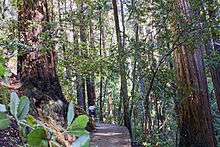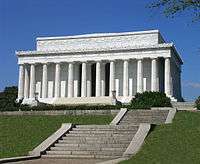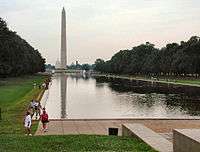List of areas in the United States National Park System
The National Park System of the United States is the collection of physical properties owned or administered by the National Park Service. The collection includes all national parks and most national monuments, as well as several other types of protected areas of the United States.

As of January 2020, there are 419 units of the National Park System.[1] However, this number is somewhat misleading. For example, Denali National Park and Preserve is counted as two units, since the same name applies to a national park and an adjacent national preserve. Yet Jean Lafitte National Historical Park and Preserve is counted as one unit, despite its double designation. Counting methodology is rooted in the language of a park's enabling legislation.
In addition to areas of the National Park System, the National Park Service also provides technical and financial assistance to several affiliated areas authorized by Congress. Affiliated areas are marked on the lists below.
The National Register of Historic Places (NRHP), which contains nearly 79,000 entries, is administered by the National Park Service. All historically significant park units are automatically included on the NRHP—i.e., all national historical parks and historic sites, national battlefields and military parks, and national memorials, as well as some national monuments.
National Park System units are found in all 50 states, in the District of Columbia, and in the U.S. territories of Guam, the Northern Mariana Islands, American Samoa, the U.S. Virgin Islands, and Puerto Rico.
Nearly all units managed by the National Park Service participate in the National Park Passport Stamps program.
National parks
Existing national parks
There are 62 officially designated national parks in the United States and its dependent areas.[2]

.jpg)
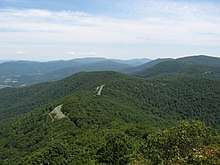
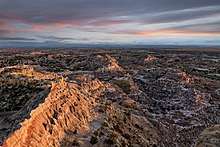
| Name | Location | Year established | Area (2019)[3] |
|---|---|---|---|
| Acadia National Park | Maine | 1919 | 49,076.63 acres (198.6061 km2) |
| National Park of American Samoa | American Samoa | 1988 | 8,256.67 acres (33.4136 km2) |
| Arches National Park | Utah | 1971 | 76,678.98 acres (310.3088 km2) |
| Badlands National Park | South Dakota | 1978 | 242,755.94 acres (982.3984 km2) |
| Big Bend National Park | Texas | 1944 | 801,163.21 acres (3,242.1925 km2) |
| Biscayne National Park | Florida | 1980 | 172,971.11 acres (699.9892 km2) |
| Black Canyon of the Gunnison National Park | Colorado | 1999 | 30,779.83 acres (124.5616 km2) |
| Bryce Canyon National Park | Utah | 1928 | 35,835.08 acres (145.0194 km2) |
| Canyonlands National Park | Utah | 1964 | 337,597.83 acres (1,366.2099 km2) |
| Capitol Reef National Park | Utah | 1971 | 241,904.50 acres (978.9528 km2) |
| Carlsbad Caverns National Park | New Mexico | 1930 | 46,766.45 acres (189.2571 km2) |
| Channel Islands National Park | California | 1980 | 249,561.00 acres (1,009.9375 km2) |
| Congaree National Park | South Carolina | 2003 | 26,476.47 acres (107.1465 km2) |
| Crater Lake National Park | Oregon | 1902 | 183,224.05 acres (741.4814 km2) |
| Cuyahoga Valley National Park | Ohio | 2000 | 32,571.88 acres (131.8137 km2) |
| Death Valley National Park | California, Nevada | 1994 | 3,408,406.73 acres (13,793.3327 km2) |
| Denali National Park | Alaska | 1917 | 4,740,911.16 acres (19,185.7868 km2) |
| Dry Tortugas National Park | Florida | 1992 | 64,701.22 acres (261.8365 km2) |
| Everglades National Park | Florida | 1947 | 1,508,938.57 acres (6,106.4577 km2) |
| Gates of the Arctic National Park | Alaska | 1980 | 7,523,897.45 acres (30,448.1327 km2) |
| Gateway Arch National Park | Missouri | 2018 | 192.83 acres (0.7804 km2) |
| Glacier National Park (part of Waterton–Glacier International Peace Park) | Montana | 1910 | 1,013,125.99 acres (4,099.9754 km2) |
| Glacier Bay National Park | Alaska | 1980 | 3,223,383.43 acres (13,044.5699 km2) |
| Grand Canyon National Park | Arizona | 1919 | 1,201,647.03 acres (4,862.8930 km2) |
| Grand Teton National Park | Wyoming | 1929 | 310,044.36 acres (1,254.7050 km2) |
| Great Basin National Park | Nevada | 1986 | 77,180.00 acres (312.3364 km2) |
| Great Sand Dunes National Park | Colorado | 2004 | 107,341.87 acres (434.3971 km2) |
| Great Smoky Mountains National Park | North Carolina, Tennessee | 1934 | 522,426.88 acres (2,114.1866 km2) |
| Guadalupe Mountains National Park | Texas | 1966 | 86,367.10 acres (349.5153 km2) |
| Haleakalā National Park | Hawaii | 1916 | 33,264.62 acres (134.6171 km2) |
| Hawaii Volcanoes National Park | Hawaii | 1916 | 325,605.28 acres (1,317.6778 km2) |
| Hot Springs National Park | Arkansas | 1921 | 5,554.15 acres (22.4768 km2) |
| Indiana Dunes National Park | Indiana | 2019 | 15,349.08 acres (62.1155 km2) |
| Isle Royale National Park | Michigan | 1940 | 571,790.30 acres (2,313.9532 km2) |
| Joshua Tree National Park | California | 1994 | 795,155.85 acres (3,217.8816 km2) |
| Katmai National Park | Alaska | 1980 | 3,674,529.33 acres (14,870.2926 km2) |
| Kenai Fjords National Park | Alaska | 1980 | 669,650.05 acres (2,709.9776 km2) |
| Kings Canyon National Park | California | 1940 | 461,901.20 acres (1,869.2478 km2) |
| Kobuk Valley National Park | Alaska | 1980 | 1,750,716.16 acres (7,084.8969 km2) |
| Lake Clark National Park | Alaska | 1980 | 2,619,816.49 acres (10,602.0212 km2) |
| Lassen Volcanic National Park | California | 1916 | 106,589.02 acres (431.3505 km2) |
| Mammoth Cave National Park | Kentucky | 1941 | 54,011.91 acres (218.5784 km2) |
| Mesa Verde National Park | Colorado | 1906 | 52,485.17 acres (212.3999 km2) |
| Mount Rainier National Park | Washington | 1899 | 236,381.64 acres (956.6026 km2) |
| North Cascades National Park | Washington | 1968 | 504,780.94 acres (2,042.7760 km2) |
| Olympic National Park | Washington | 1938 | 922,649.41 acres (3,733.8297 km2) |
| Petrified Forest National Park | Arizona | 1962 | 221,390.21 acres (895.9344 km2) |
| Pinnacles National Park | California | 2013 | 26,685.73 acres (107.9933 km2) |
| Redwood National and State Parks | California | 1968 | 138,999.37 acres (562.5105 km2) |
| Rocky Mountain National Park | Colorado | 1915 | 265,807.25 acres (1,075.6838 km2) |
| Saguaro National Park | Arizona | 1994 | 91,715.72 acres (371.1604 km2) |
| Sequoia National Park | California | 1890 | 404,062.63 acres (1,635.1834 km2) |
| Shenandoah National Park | Virginia | 1935 | 199,223.77 acres (806.2300 km2) |
| Theodore Roosevelt National Park | North Dakota | 1978 | 70,446.89 acres (285.0884 km2) |
| Virgin Islands National Park | U.S. Virgin Islands | 1956 | 15,052.33 acres (60.9146 km2) |
| Voyageurs National Park | Minnesota | 1975 | 218,222.35 acres (883.1145 km2) |
| White Sands National Park | New Mexico | 2019 | 146,344.31 acres (592.2344 km2) |
| Wind Cave National Park | South Dakota | 1903 | 33,970.84 acres (137.4751 km2) |
| Wrangell–St. Elias National Park | Alaska | 1980 | 8,323,146.48 acres (33,682.5788 km2) |
| Yellowstone National Park | Idaho, Montana, Wyoming | 1872 | 2,219,790.71 acres (8,983.1743 km2) |
| Yosemite National Park | California | 1890 | 761,747.50 acres (3,082.6828 km2) |
| Zion National Park | Utah | 1919 | 147,242.66 acres (595.8699 km2) |
Disbanded national parks
| Name | Established | Disbanded | Result |
|---|---|---|---|
| Abraham Lincoln National Park | July 17, 1916 | August 11, 1939 | Redesignated as Abraham Lincoln Birthplace National Historical Park |
| Fort McHenry National Park | March 3, 1925 | August 11, 1939 | Redesignated under the unique designation of Fort McHenry National Monument and Historic Shrine |
| General Grant National Park | October 1, 1890 | March 4, 1940 | Incorporated into Kings Canyon National Park |
| Hawaii National Park | August 1, 1916 | September 13, 1960 | Divided into Hawaii Volcanoes National Park and Haleakala National Park |
| Mackinac National Park | April 15, 1875 | March 2, 1895 | Transferred to Michigan; now operated as Mackinac Island State Park |
| Platt National Park | June 29, 1906 | March 17, 1976 | Incorporated with Arbuckle Recreation Area and redesignated Chickasaw National Recreation Area |
| Rock Creek Park[4] | September 27, 1890 | August 10, 1933 | Incorporated into National Capital Parks |
| Sullys Hill National Park | April 27, 1904 | March 3, 1931 | Transferred to the U.S. Fish and Wildlife Service; now operated as White Horse Hill National Game Preserve |
National monuments

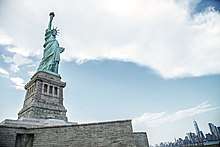
.jpg)
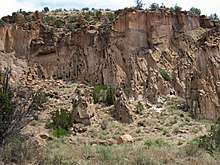
As of 2019, there are 128 national monuments, 84 of which are administered by the NPS and are listed below. The remaining 44 monuments are administered by five other federal agencies. Two, Grand Canyon–Parashant and Craters of the Moon National Monuments, are jointly administered by the NPS and the Bureau of Land Management, and Tule Lake National Monument is joint with the Fish and Wildlife Service.
| Name | Location | Area[3] |
|---|---|---|
| African Burial Ground National Monument | New York | 0.35 acres (0.0014 km2) |
| Agate Fossil Beds National Monument | Nebraska | 3,057.87 acres (12.3748 km2) |
| Alibates Flint Quarries National Monument | Texas | 1,370.97 acres (5.5481 km2) |
| Aniakchak National Monument and Preserve | Alaska | 137,176.00 acres (555.1316 km2) |
| Aztec Ruins National Monument | New Mexico | 318.40 acres (1.2885 km2) |
| Bandelier National Monument | New Mexico | 33,676.67 acres (136.2846 km2) |
| Belmont–Paul Women's Equality National Monument | District of Columbia | 0.34 acres (0.0014 km2) |
| Birmingham Civil Rights National Monument | Alabama | 18.25 acres (0.0739 km2) |
| Booker T. Washington National Monument | Virginia | 239.01 acres (0.9672 km2) |
| Buck Island Reef National Monument | U.S. Virgin Islands | 19,015.47 acres (76.9529 km2) |
| Cabrillo National Monument | California | 159.94 acres (0.6473 km2) |
| Camp Nelson Heritage National Monument | Kentucky | 380.12 acres (1.5383 km2) |
| Canyon de Chelly National Monument | Arizona | 83,840.00 acres (339.2884 km2) |
| Cape Krusenstern National Monument and Archeological District | Alaska | 649,096.15 acres (2,626.7989 km2) |
| Capulin Volcano National Monument | New Mexico | 792.84 acres (3.2085 km2) |
| Casa Grande Ruins National Monument | Arizona | 472.50 acres (1.9121 km2) |
| Castillo de San Marcos National Monument | Florida | 19.38 acres (0.0784 km2) |
| Castle Clinton National Monument | New York | 1.00 acre (0.0040 km2) |
| Castle Mountains National Monument | California | 21,025.50 acres (85.0872 km2) |
| Cedar Breaks National Monument | Utah | 6,154.60 acres (24.9068 km2) |
| César E. Chávez National Monument | California | 116.56 acres (0.4717 km2) |
| Charles Young Buffalo Soldiers National Monument | Ohio | 59.66 acres (0.2414 km2) |
| Chiricahua National Monument | Arizona | 12,024.73 acres (48.6624 km2) |
| Colorado National Monument | Colorado | 20,536.39 acres (83.1078 km2) |
| Craters of the Moon National Monument and Preserve | Idaho | 53,437.64 acres (216.2545 km2) |
| Devils Postpile National Monument | California | 800.19 acres (3.2383 km2) |
| Devils Tower National Monument | Wyoming | 1,347.21 acres (5.4520 km2) |
| Dinosaur National Monument | Utah, Colorado | 210,281.92 acres (850.9807 km2) |
| Effigy Mounds National Monument | Iowa | 2,526.39 acres (10.2239 km2) |
| El Malpais National Monument | New Mexico | 114,347.11 acres (462.7463 km2) |
| El Morro National Monument | New Mexico | 1,278.72 acres (5.1748 km2) |
| Florissant Fossil Beds National Monument | Colorado | 6,278.09 acres (25.4065 km2) |
| Fort Frederica National Monument | Georgia | 305.34 acres (1.2357 km2) |
| Fort Matanzas National Monument | Florida | 300.11 acres (1.2145 km2) |
| Fort McHenry National Monument and Historic Shrine | Maryland | 43.26 acres (0.1751 km2) |
| Fort Monroe National Monument | Virginia | 367.12 acres (1.4857 km2) |
| Fort Pulaski National Monument | Georgia | 5,623.10 acres (22.7559 km2) |
| Fort Stanwix National Monument | New York | 15.52 acres (0.0628 km2) |
| Fort Union National Monument | New Mexico | 720.60 acres (2.9162 km2) |
| Fossil Butte National Monument | Wyoming | 8,198.00 acres (33.1761 km2) |
| Freedom Riders National Monument | Alabama | 7.83 acres (0.0317 km2) |
| George Washington Birthplace National Monument | Virginia | 653.18 acres (2.6433 km2) |
| George Washington Carver National Monument | Missouri | 240.00 acres (0.9712 km2) |
| Gila Cliff Dwellings National Monument | New Mexico | 533.13 acres (2.1575 km2) |
| Governors Island National Monument | New York | 22.91 acres (0.0927 km2) |
| Grand Canyon–Parashant National Monument | Arizona | NPS manages 208,453 acres (843.58 km2) of 1,048,325 acres (4,242.42 km2) |
| Grand Portage National Monument | Minnesota | 709.97 acres (2.8731 km2) |
| Hagerman Fossil Beds National Monument | Idaho | 4,351.15 acres (17.6085 km2) |
| Hohokam Pima National Monument | Arizona | 1,690.00 acres (6.8392 km2) |
| Homestead National Monument of America | Nebraska | 210.45 acres (0.8517 km2) |
| Hovenweep National Monument | Colorado, Utah | 784.93 acres (3.1765 km2) |
| Jewel Cave National Monument | South Dakota | 1,273.51 acres (5.1537 km2) |
| John Day Fossil Beds National Monument | Oregon | 14,062.19 acres (56.9077 km2) |
| Katahdin Woods and Waters National Monument | Maine | 87,564.27 acres (354.3600 km2) |
| Lava Beds National Monument | California | 46,692.42 acres (188.9575 km2) |
| Little Bighorn Battlefield National Monument | Montana | 765.34 acres (3.0972 km2) |
| Montezuma Castle National Monument | Arizona | 1,015.52 acres (4.1097 km2) |
| Muir Woods National Monument | California | 553.55 acres (2.2401 km2) |
| Natural Bridges National Monument | Utah | 7,636.49 acres (30.9038 km2) |
| Navajo National Monument | Arizona | 360.00 acres (1.4569 km2) |
| Oregon Caves National Monument and Preserve | Oregon | 4,554.03 acres (18.4295 km2) |
| Organ Pipe Cactus National Monument | Arizona | 330,688.86 acres (1,338.2503 km2) |
| Petroglyph National Monument | New Mexico | 7,209.30 acres (29.1750 km2) |
| Pipe Spring National Monument | Arizona | 40.00 acres (0.1619 km2) |
| Pipestone National Monument | Minnesota | 281.78 acres (1.1403 km2) |
| Poverty Point National Monument | Louisiana | 910.85 acres (3.6861 km2) |
| Pullman National Monument | Illinois | 203 acres (0.82 km2) |
| Rainbow Bridge National Monument | Utah | 160.00 acres (0.6475 km2) |
| Russell Cave National Monument | Alabama | 310.45 acres (1.2563 km2) |
| Salinas Pueblo Missions National Monument | New Mexico | 1,071.42 acres (4.3359 km2) |
| Scotts Bluff National Monument | Nebraska | 3,004.81 acres (12.1600 km2) |
| Statue of Liberty National Monument | New York, New Jersey | 58.38 acres (0.2363 km2) |
| Stonewall National Monument | New York | 7.70 acres (0.0312 km2) |
| Sunset Crater Volcano National Monument | Arizona | 3,040.00 acres (12.3024 km2) |
| Timpanogos Cave National Monument | Utah | 250.00 acres (1.0117 km2) |
| Tonto National Monument | Arizona | 1,120.00 acres (4.5325 km2) |
| Tule Lake National Monument | California | 37.39 acres (0.1513 km2) |
| Tule Springs Fossil Beds National Monument | Nevada | 22,650.00 acres (91.6613 km2) |
| Tuzigoot National Monument | Arizona | 811.89 acres (3.2856 km2) |
| Virgin Islands Coral Reef National Monument | U.S. Virgin Islands | 12,708.07 acres (51.4277 km2) |
| Waco Mammoth National Monument | Texas | 107.23 acres (0.4339 km2) |
| Walnut Canyon National Monument | Arizona | 3,200.61 acres (12.9524 km2) |
| Wupatki National Monument | Arizona | 35,401.83 acres (143.2661 km2) |
| Yucca House National Monument | Colorado | 33.87 acres (0.1371 km2) |
Authorized national monuments
| Name | State | Status |
|---|---|---|
| Medgar and Myrlie Evers Home[5][6] | Mississippi | Pending acquisition of property |
| Mill Springs Battlefield[5][6] | Kentucky | Pending acquisition of property |
Former national monuments
| Name | Established | Disbanded | Result |
|---|---|---|---|
| Carlsbad Cave National Monument | October 5, 1923 | May 14, 1930 | Redesignated as Carlsbad Caverns National Park |
| Denali National Monument | December 1, 1978 | December 2, 1980 | Incorporated with Mount McKinley National Park and renamed Denali National Park and Preserve |
| Grand Canyon National Monument | January 11, 1908 | February 26, 1919 | Redesignated as Grand Canyon National Park |
| Grand Canyon National Monument | December 22, 1932 | January 3, 1975 | Abolished; lands transferred with Marble Canyon National Monument into an expansion of Grand Canyon National Park.[7][8][9][10] |
| Marble Canyon National Monument | January 20, 1969 | January 3, 1975 | Abolished; lands transferred with Grand Canyon National Monument into an expansion of Grand Canyon National Park. |
| Kobuk Valley National Monument | December 1, 1978 | December 2, 1980 | Redesignated as Kobuk Valley National Park |
| Papago Saguaro National Monument | January 31, 1914 | April 7, 1930 | Transferred to Arizona; now jointly operated by the cities of Phoenix and Tempe |
| Lewis and Clark Cavern National Monument | May 11, 1908 | August 24, 1937 | Transferred to Montana; now operated as a state park |
| Kenai Fjords National Monument | December 1, 1978 | December 2, 1980 | Redesignated as Kenai Fjords National Park |
| Channel Islands National Monument | April 26, 1938 | March 5, 1980 | Redesignated as Channel Islands National Park |
| Father Millet Cross National Monument | August 10, 1933 | September 7, 1949 | Transferred to New York upon the closing of the adjacent military base; now operated part of Fort Niagara State Park |
| First State National Monument | March 25, 2013 | December 19, 2014 | Incorporated into First State National Historical Park |
| Lake Clark National Monument | December 1, 1978 | December 2, 1980 | Renamed Lake Clark National Park and Preserve |
| Black Canyon of the Gunnison National Monument | March 2, 1933 | October 21, 1999 | Redesignated as Black Canyon of the Gunnison National Park |
| Harriet Tubman Underground Railroad National Monument | March 25, 2013 | December 19, 2014 | The National Park Service areas of this monument were incorporated into Harriet Tubman Underground Railroad National Historical Park, and the National Park Service no longer recognizes their portions of the national monument as distinct from the national historical park. The remaining portions of Harriet Tubman Underground Railroad National Monument continue to be operated by the U.S. Fish and Wildlife Service. |
| Mukuntuweap National Monument (renamed Zion National Monument in 1918) |
July 31, 1909 | November 19, 1919 | Redesignated as Zion National Park |
| Zion National Monument ("the Kolob Canyons area") |
January 22, 1937 | July 11, 1956 | Incorporated into Zion National Park |
| Capitol Reef National Monument | August 2, 1937 | December 18, 1971 | Redesignated as Capitol Reef National Park |
| Arches National Monument | April 12, 1929 | November 12, 1971 | Redesignated as Arches National Park |
| Bryce Canyon National Monument | June 8, 1923 | February 25, 1928 | Redesignated as Bryce Canyon National Park |
| Wheeler National Monument | December 7, 1908 | August 3, 1950 | Returned to United States Forest Service |
| Holy Cross National Monument | May 11, 1929 | August 3, 1950 | Returned to United States Forest Service |
| White Sands National Monument | January 18, 1933 | December 20, 2019 | Redesignated as White Sands National Park |
| Jackson Hole National Monument | 1943 | September 14, 1950 | Merged into Grand Teton National Park |
| Shoshone Cavern National Monument | September 21, 1909 | May 17, 1954 | Transferred to Cody, Wyoming as a municipal attraction, and later returned to the Bureau of Land Management |
| Old Kasaan National Monument | October 25, 1916 | July 26, 1955 | Transferred to United States Forest Service |
| Castle Pinckney National Monument | August 10, 1933 | March 29, 1956 | Transferred to South Carolina, and later sold to the Sons of Confederate Veterans; site currently inaccessible and unmaintained |
| Saguaro National Monument | March 1, 1933 | October 4, 1994 | Redesignated as Saguaro National Park |
| Verendrye National Monument | June 29, 1917 | July 30, 1956 | Transferred to North Dakota after the construction of the Garrison Dam; site currently flooded by the reservoir Lake Sakakawea |
| Gates of the Arctic National Monument | December 1, 1978 | December 2, 1980 | Renamed Gates of the Arctic National Park and Preserve |
| Fossil Cycad National Monument | October 21, 1922 | August 1, 1956 | Transferred to Bureau of Land Management because of severe vandalism to the site |
| Death Valley National Monument | February 11, 1933 | October 31, 1994 | Redesignated as Death Valley National Park |
| Joshua Tree National Monument | August 10, 1936 | October 31, 1994 | Redesignated as Joshua Tree National Park |
| Ackia Battlefield National Monument | August 27, 1935 | August 10, 1961 | Incorporated into Natchez Trace Parkway |
| Meriwether Lewis National Monument | February 6, 1925 | August 10, 1961 | Incorporated into Natchez Trace Parkway |
| Katmai National Monument | September 24, 1918 | December 2, 1980 | Renamed Katmai National Park and Preserve |
| Mount Olympus National Monument | March 2, 1909 | June 29, 1938 | Redesignated as Olympic National Park |
| Petrified Forest National Monument | December 8, 1906 | December 9, 1962 | Redesignated as Petrified Forest National Park |
| Lehman Caves National Monument | June 10, 1933 | October 27, 1986 | Abolished; incorporated into Great Basin National Park[11] |
| Congaree Swamp National Monument | October 18, 1976 | November 10, 2003 | Redesignated as Congaree National Park |
| Glacier Bay National Monument | February 25, 1925 | December 2, 1980 | Renamed Glacier Bay National Park and Preserve |
| Mound City Group National Monument | January 1, 1918 | January 2, 1992 | Incorporated into Hopewell Culture National Historical Park |
| Minidoka Internment National Monument | January 17, 2001 | May 8, 2008 | Redesignated as Minidoka National Historic Site |
| Pinnacles National Monument | January 16, 1908 | January 10, 2013 | Redesignated as Pinnacles National Park[12] |
| Andrew Johnson National Monument | April 27, 1942 | December 11, 1963 | Redesignated as Andrew Johnson National Historic Site[13] |
| Sieur de Monts National Monument | July 8, 1916 | February 26, 1919 | Redesignated as Lafayette National Park (renamed Acadia National Park on January 19, 1929) |
| Edison Laboratory National Monument | July 14, 1956 | September 5, 1962 | Combined with Edison Home National Historic Site into Edison National Historic Site, later redesignated Thomas Edison National Historical Park |
| Wrangell–St. Elias National Monument | December 1, 1978 | December 2, 1980 | Renamed Wrangell–St. Elias National Park and Preserve |
| Badlands National Monument | January 29, 1939 | November 10, 1978 | Redesignated as Badlands National Park |
| Great Sand Dunes National Monument | March 17, 1932 | September 14, 2004 | Renamed Great Sand Dunes National Park and Preserve |
| Biscayne National Monument | October 18, 1968 | June 28, 1980 | Redesignated as Biscayne National Park |
| Fort Jefferson National Monument | January 4, 1935 | October 26, 1992 | Redesignated as Dry Tortugas National Park |
| Cinder Cone National Monument | May 6, 1907 | August 9, 1916 | Merged with Lassen Peak National Monument and redesignated as Lassen Volcanic National Park |
| Lassen Peak National Monument | May 6, 1907 | August 9, 1916 | Merged with Cinder Cone National Monument and redesignated as Lassen Volcanic National Park |
National preserves
There are 19 national preserves in the United States. Ten are distinct stand-alone official units of the National Park System, while nine others are merely areas of distinct management policies and land-use restrictions within a larger "national park and preserve" or "national monument and preserve" that are counted as two units of the National Park System by the National Park Service. Two other sites are areas of distinct management policies and land-use restrictions within a larger park (Oregon Caves National Monument and Preserve and Jean Lafitte National Historical Park and Preserve) but by statute are counted by the National Park Service as single units of the National Park System.
| Name | Location | Area (2017) |
|---|---|---|
| Aniakchak National Monument and Preserve | Alaska | 464,117.93 acres (1,878.2186 km2) |
| Bering Land Bridge National Preserve | Alaska | 2,697,391.01 acres (10,915.9541 km2) |
| Big Cypress National Preserve | Florida | 720,564.01 acres (2,916.0191 km2) |
| Big Thicket National Preserve | Texas | 113,121.96 acres (457.7883 km2) |
| Craters of the Moon National Monument and Preserve | Idaho | 698,939.69 acres (2,828.5086 km2) |
| Denali National Park and Preserve | Alaska | 1,334,117.80 acres (5,398.9832 km2) |
| Gates of the Arctic National Park and Preserve | Alaska | 948,608.07 acres (3,838.8807 km2) |
| Glacier Bay National Park and Preserve | Alaska | 58,406.00 acres (236.3607 km2) |
| Great Sand Dunes National Park and Preserve | Colorado | 41,686.00 acres (168.6973 km2) |
| Katmai National Park and Preserve | Alaska | 418,698.80 acres (1,694.4139 km2) |
| Lake Clark National Park and Preserve | Alaska | 1,410,293.68 acres (5,707.2560 km2) |
| Little River Canyon National Preserve | Alabama | 15,291.63 acres (61.8830 km2) |
| Mojave National Preserve | California | 1,545,709.49 acres (6,255.2644 km2) |
| Noatak National Preserve | Alaska | 6,587,071.39 acres (26,656.9322 km2) |
| Tallgrass Prairie National Preserve | Kansas | 10,882.67 acres (44.0406 km2) |
| Timucuan Ecological and Historic Preserve | Florida | 46,262.67 acres (187.2184 km2) |
| Valles Caldera National Preserve | New Mexico | 89,766.09 acres (363.2705 km2) |
| Wrangell–St. Elias National Park and Preserve | Alaska | 4,852,644.52 acres (19,637.9556 km2) |
| Yukon–Charley Rivers National Preserve | Alaska | 2,526,512.44 acres (10,224.4331 km2) |
National historical parks
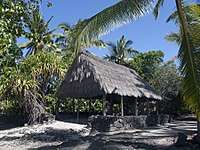


There are 57 national historical parks.
| Name | Location | Area (2017) |
|---|---|---|
| Abraham Lincoln Birthplace National Historical Park | Kentucky | 344.50 acres (1.3941 km2) |
| Adams National Historical Park | Massachusetts | 23.82 acres (0.0964 km2) |
| Appomattox Court House National Historical Park | Virginia | 1,774.60 acres (7.1816 km2) |
| Blackstone River Valley National Historical Park | Rhode Island, Massachusetts | 1,489.00 acres (6.0258 km2) |
| Boston National Historical Park | Massachusetts | 43.82 acres (0.1773 km2) |
| Cane River Creole National Historical Park | Louisiana | 205.50 acres (0.8316 km2) |
| Cedar Creek and Belle Grove National Historical Park | Virginia | 3,707.09 acres (15.0021 km2) |
| Chaco Culture National Historical Park | New Mexico | 33,960.19 acres (137.4320 km2) |
| Chesapeake and Ohio Canal National Historical Park | District of Columbia, Maryland, West Virginia | 19,612.37 acres (79.3684 km2) |
Colonial National Historical Park[14]
|
Virginia | 8,675.04 acres (35.1066 km2) |
| Cumberland Gap National Historical Park | Kentucky, Tennessee, Virginia | 24,546.83 acres (99.3375 km2) |
| Dayton Aviation Heritage National Historical Park | Ohio | 110.56 acres (0.4474 km2) |
| First State National Historical Park | Delaware, Pennsylvania | 1,155.04 acres (4.6743 km2) |
| Fort Sumter and Fort Moultrie National Historical Park | South Carolina | 234.74 acres (0.9500 km2) |
| George Rogers Clark National Historical Park | Indiana | 26.17 acres (0.1059 km2) |
| Golden Spike National Historical Park | Utah | 2,735.28 acres (11.0693 km2) |
| Harpers Ferry National Historical Park | West Virginia, Virginia, Maryland | 3,669.19 acres (14.8487 km2) |
| Harriet Tubman National Historical Park | New York | 31.50 acres (0.1275 km2) |
| Harriet Tubman Underground Railroad National Historical Park | Maryland | 480.00 acres (1.9425 km2) |
| Hopewell Culture National Historical Park | Ohio | 1,775.78 acres (7.1863 km2) |
Independence National Historical Park
|
Pennsylvania | 44.87 acres (0.1816 km2) |
Jean Lafitte National Historical Park and Preserve
|
Louisiana | 25,875.86 acres (104.7159 km2) |
| Kalaupapa National Historical Park | Hawaii | 10,778.88 acres (43.6206 km2) |
| Kaloko-Honokōhau National Historical Park | Hawaii | 1,163.05 acres (4.7067 km2) |
| Keweenaw National Historical Park | Michigan | 1,870.00 acres (7.5676 km2) |
| Klondike Gold Rush National Historical Park (part of Klondike Gold Rush International Historical Park) | Alaska, Washington | 12,996.49 acres (52.5949 km2) |
| Lewis and Clark National and State Historical Parks | Oregon, Washington | 3,410.15 acres (13.8004 km2) |
| Lowell National Historical Park | Massachusetts | 141.67 acres (0.5733 km2) |
| Lyndon B. Johnson National Historical Park | Texas | 1,571.71 acres (6.3605 km2) |
| Manhattan Project National Historical Park | New Mexico, Tennessee, Washington | 113.61 acres (0.4598 km2) |
| Marsh-Billings-Rockefeller National Historical Park | Vermont | 643.07 acres (2.6024 km2) |
| Martin Luther King Jr. National Historical Park | Georgia | 39.17 acres (0.1585 km2) |
| Minute Man National Historical Park | Massachusetts | 1,027.76 acres (4.1592 km2) |
| Morristown National Historical Park | New Jersey | 1,710.72 acres (6.9230 km2) |
| Natchez National Historical Park | Mississippi | 108.30 acres (0.4383 km2) |
| New Bedford Whaling National Historical Park | Massachusetts | 34.00 acres (0.1376 km2) |
| New Orleans Jazz National Historical Park | Louisiana | 5.13 acres (0.0208 km2) |
| Nez Perce National Historical Park | Idaho, Montana, Oregon, Washington | 4,564.93 acres (18.4736 km2) |
| Ocmulgee Mounds National Historical Park | Georgia | 3,335.79 acres (13.4995 km2) |
| Palo Alto Battlefield National Historical Park | Texas | 3,441.74 acres (13.9282 km2) |
| Paterson Great Falls National Historical Park | New Jersey | 51.32 acres (0.2077 km2) |
| Pecos National Historical Park | New Mexico | 6,693.49 acres (27.0876 km2) |
| Puʻuhonua o Hōnaunau National Historical Park | Hawaii | 419.80 acres (1.6989 km2) |
| Reconstruction Era National Historical Park | South Carolina | 15.53 acres (0.0628 km2) |
| Rosie the Riveter/World War II Home Front National Historical Park | California | 145.19 acres (0.5876 km2) |
| Saint-Gaudens National Historical Park | New Hampshire | 190.75 acres (0.7719 km2) |
| Salt River Bay National Historical Park and Ecological Preserve | U.S. Virgin Islands | 989.42 acres (4.0040 km2) |
| San Antonio Missions National Historical Park | Texas | 947.77 acres (3.8355 km2) |
| San Francisco Maritime National Historical Park | California | 49.86 acres (0.2018 km2) |
| San Juan Island National Historical Park | Washington | 2,145.56 acres (8.6828 km2) |
| Saratoga National Historical Park | New York | 3,579.14 acres (14.4843 km2) |
| Sitka National Historical Park | Alaska | 116.29 acres (0.4706 km2) |
| Thomas Edison National Historical Park | New Jersey | 21.25 acres (0.0860 km2) |
| Tumacácori National Historical Park | Arizona | 360.32 acres (1.4582 km2) |
| Valley Forge National Historical Park | Pennsylvania | 3,468.54 acres (14.0367 km2) |
| War in the Pacific National Historical Park | Guam | 2,030.65 acres (8.2177 km2) |
| Women's Rights National Historical Park | New York | 7.44 acres (0.0301 km2) |
- Authorized national historical parks
| Name | Status |
|---|---|
| Coltsville National Historical Park | Connecticut (pending acquisition of property) |
| Ste. Genevieve National Historical Park | Missouri (pending acquisition of property) |
National historic sites

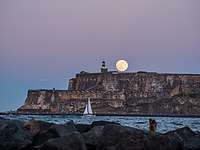

The National Park Service administers the national historic sites, with the exception of Grey Towers National Historic Site (managed by the U.S. Forest Service) and those that are managed as Affiliated Areas of the National Park System.
There are 89 national historic sites, of which 78 are NPS units and 11 are affiliated areas.
| Name | Location | Area (2017) |
|---|---|---|
| Aleutian World War II National Historic Area (affiliated area) | Alaska | |
| Allegheny Portage Railroad National Historic Site | Pennsylvania | 1,284.27 acres (5.1973 km2) |
Andersonville National Historic Site
|
Georgia | 515.61 acres (2.0866 km2) |
Andrew Johnson National Historic Site
|
Tennessee | 16.68 acres (0.0675 km2) |
| Bent's Old Fort National Historic Site | Colorado | 798.80 acres (3.2326 km2) |
| Boston African American National Historic Site | Massachusetts | 0.59 acres (0.0024 km2) |
| Brown v. Board of Education National Historic Site | Kansas | 1.85 acres (0.0075 km2) |
| Carl Sandburg Home National Historic Site | North Carolina | 268.49 acres (1.0865 km2) |
| Carter G. Woodson Home National Historic Site | Washington, D.C. | 0.15 acres (0.00061 km2) |
| Charles Pinckney National Historic Site | South Carolina | 28.45 acres (0.1151 km2) |
| Chicago Portage National Historic Site (affiliated area) | Illinois | |
| Chimney Rock National Historic Site (affiliated area) | Nebraska | |
| Christiansted National Historic Site | U.S. Virgin Islands | 27.15 acres (0.1099 km2) |
| Clara Barton National Historic Site | Maryland | 8.59 acres (0.0348 km2) |
| Edgar Allan Poe National Historic Site | Pennsylvania | 0.52 acres (0.0021 km2) |
| Eisenhower National Historic Site | Pennsylvania | 690.46 acres (2.7942 km2) |
| Eleanor Roosevelt National Historic Site | New York | 180.50 acres (0.7305 km2) |
| Eugene O'Neill National Historic Site | California | 13.19 acres (0.0534 km2) |
| Fallen Timbers Battlefield and Fort Miamis National Historic Site (affiliated area) | Ohio | |
| First Ladies National Historic Site | Ohio | 0.46 acres (0.0019 km2) |
| Ford's Theatre National Historic Site | Washington, D.C. | 0.30 acres (0.0012 km2) |
| Fort Bowie National Historic Site | Arizona | 999.45 acres (4.0446 km2) |
| Fort Davis National Historic Site | Texas | 523.00 acres (2.1165 km2) |
| Fort Laramie National Historic Site | Wyoming | 873.11 acres (3.5334 km2) |
| Fort Larned National Historic Site | Kansas | 718.39 acres (2.9072 km2) |
| Fort Point National Historic Site | California | 29.00 acres (0.1174 km2) |
| Fort Raleigh National Historic Site | North Carolina | 512.93 acres (2.0758 km2) |
| Fort Scott National Historic Site | Kansas | 20.13 acres (0.0815 km2) |
| Fort Smith National Historic Site | Arkansas, Oklahoma | 75.00 acres (0.3035 km2) |
| Fort Union Trading Post National Historic Site | Montana, North Dakota | 440.14 acres (1.7812 km2) |
Fort Vancouver National Historic Site
|
Washington, Oregon | 206.72 acres (0.8366 km2) |
| Frederick Douglass National Historic Site | Washington, D.C. | 8.57 acres (0.0347 km2) |
| Frederick Law Olmsted National Historic Site | Massachusetts | 7.21 acres (0.0292 km2) |
| Friendship Hill National Historic Site | Pennsylvania | 674.56 acres (2.7298 km2) |
| Gloria Dei (Old Swedes') Church National Historic Site (affiliated area) | Pennsylvania | |
| Grant-Kohrs Ranch National Historic Site | Montana | 1,618.43 acres (6.5496 km2) |
| Hampton National Historic Site | Maryland | 62.04 acres (0.2511 km2) |
| Harry S Truman National Historic Site | Missouri | 12.59 acres (0.0509 km2) |
| Herbert Hoover National Historic Site | Iowa | 186.80 acres (0.7560 km2) |
| Historic Camden Revolutionary War Site (affiliated area) | South Carolina | |
| Home of Franklin D. Roosevelt National Historic Site | New York | 838.43 acres (3.3930 km2) |
| Honouliuli National Historic Site | Hawaii | 154.46 acres (0.6251 km2) |
| Hopewell Furnace National Historic Site | Pennsylvania | 848.06 acres (3.4320 km2) |
| Hubbell Trading Post National Historic Site | Arizona | 160.09 acres (0.6479 km2) |
| James A. Garfield National Historic Site | Ohio | 7.82 acres (0.0316 km2) |
| Jamestown National Historic Site (affiliated area) | Virginia | |
| Jimmy Carter National Historic Site | Georgia | 72.21 acres (0.2922 km2) |
| John Fitzgerald Kennedy National Historic Site | Massachusetts | 0.09 acres (0.00036 km2) |
| John Muir National Historic Site | California | 344.14 acres (1.3927 km2) |
| Kate Mullany National Historic Site (affiliated area) | New York | |
| Knife River Indian Villages National Historic Site | North Dakota | 1,748.80 acres (7.0771 km2) |
| Lincoln Home National Historic Site | Illinois | 12.24 acres (0.0495 km2) |
| Little Rock Central High School National Historic Site | Arkansas | 28.22 acres (0.1142 km2) |
| Longfellow House–Washington's Headquarters National Historic Site | Massachusetts | 1.98 acres (0.0080 km2) |
| Lower East Side Tenement National Historic Site (affiliated area) | New York | |
| Maggie L. Walker National Historic Site | Virginia | 1.29 acres (0.0052 km2) |
| Manzanar National Historic Site | California | 813.81 acres (3.2934 km2) |
| Martin Van Buren National Historic Site | New York | 284.93 acres (1.1531 km2) |
| Mary McLeod Bethune Council House National Historic Site | Washington, D.C. | 0.07 acres (0.00028 km2) |
| Minidoka National Historic Site | Idaho | 396.30 acres (1.6038 km2) |
| Minuteman Missile National Historic Site | South Dakota | 43.80 acres (0.1773 km2) |
| Nicodemus National Historic Site | Kansas | 4.59 acres (0.0186 km2) |
| Ninety Six National Historic Site | South Carolina | 1,021.94 acres (4.1356 km2) |
| Pennsylvania Avenue National Historic Site | Washington, D.C. | 17.61 acres (0.0713 km2) |
| President William Jefferson Clinton Birthplace Home National Historic Site | Arkansas | 0.68 acres (0.0028 km2) |
| Puʻukoholā Heiau National Historic Site | Hawaii | 86.24 acres (0.3490 km2) |
| Sagamore Hill National Historic Site | New York | 83.02 acres (0.3360 km2) |
| Saint Paul's Church National Historic Site | New York | 6.13 acres (0.0248 km2) |
| Salem Maritime National Historic Site | Massachusetts | 9.02 acres (0.0365 km2) |
| San Juan National Historic Site | Puerto Rico | 75.13 acres (0.3040 km2) |
| Sand Creek Massacre National Historic Site | Colorado | 12,583.34 acres (50.9230 km2) |
| Saugus Iron Works National Historic Site | Massachusetts | 8.51 acres (0.0344 km2) |
| Springfield Armory National Historic Site | Massachusetts | 54.93 acres (0.2223 km2) |
| Steamtown National Historic Site | Pennsylvania | 62.48 acres (0.2528 km2) |
| Theodore Roosevelt Birthplace National Historic Site | New York | 0.11 acres (0.00045 km2) |
| Theodore Roosevelt Inaugural National Historic Site | New York | 1.18 acres (0.0048 km2) |
| Thomas Cole National Historic Site (affiliated area) | New York | |
| Thomas Stone National Historic Site | Maryland | 328.25 acres (1.3284 km2) |
| Touro Synagogue National Historic Site (affiliated area) | Rhode Island | |
| Tuskegee Airmen National Historic Site | Alabama | 89.68 acres (0.3629 km2) |
| Tuskegee Institute National Historic Site | Alabama | 57.92 acres (0.2344 km2) |
| Ulysses S. Grant National Historic Site | Missouri | 9.60 acres (0.0388 km2) |
| Vanderbilt Mansion National Historic Site | New York | 211.65 acres (0.8565 km2) |
| Washita Battlefield National Historic Site | Oklahoma | 315.20 acres (1.2756 km2) |
| Weir Farm National Historic Site | Connecticut | 74.20 acres (0.3003 km2) |
| Whitman Mission National Historic Site | Washington | 138.53 acres (0.5606 km2) |
| William Howard Taft National Historic Site | Ohio | 3.64 acres (0.0147 km2) |
Disbanded national historic sites
| Name | Established | Disbanded | Result |
|---|---|---|---|
| Atlanta Campaign National Historic Site | October 13, 1944 | September 21, 1950 | Transferred to state of Georgia; park never developed beyond a set of six roadside interpretive markers along the Dixie Highway |
| Mar-a-Lago National Historic Site | October 21, 1972 | December 23, 1980 | Returned to a nonprofit foundation operated by the Post family, the original owners of the site |
| McLoughlin House National Historic Site | June 27, 1941 | July 29, 2003 | Merged into Fort Vancouver National Historic Site |
| St. Thomas National Historic Site | December 24, 1960 | February 5, 1975 | Transferred to U.S. Virgin Islands; currently operated as a Virgin Islands territorial park |
| Sewall-Belmont House National Historic Site | April 12, 2016 | Redesignated Belmont-Paul Women's Equality National Monument and changed from affiliated unit to an NPS unit | |
| Edison Home National Historic Site | December 6, 1955 | September 5, 1962 | Combined with Edison Laboratory National Monument into Edison National Historic Site, later redesignated Thomas Edison National Historical Park |
| Edison National Historic Site | September 5, 1962 | March 30, 2009 | Redesignated Thomas Edison National Historical Park |
International historic site
| Name[2] | Location |
|---|---|
| Saint Croix Island International Historic Site | Maine/New Brunswick |
National battlefield parks
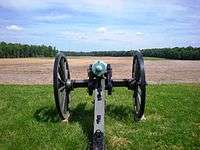
| Name[2] | Location |
|---|---|
| Kennesaw Mountain National Battlefield Park | Georgia |
| Manassas National Battlefield Park | Virginia |
| Richmond National Battlefield Park | Virginia |
| River Raisin National Battlefield Park | Michigan |
National military parks

| Name[2] | Location |
|---|---|
| Chickamauga and Chattanooga National Military Park | Georgia, Tennessee |
Fredericksburg and Spotsylvania County Battlefields Memorial National Military Park
|
Virginia |
Gettysburg National Military Park
|
Pennsylvania |
| Guilford Courthouse National Military Park | North Carolina |
| Horseshoe Bend National Military Park | Alabama |
| Kings Mountain National Military Park | South Carolina |
| Pea Ridge National Military Park | Arkansas |
Shiloh National Military Park
|
Tennessee, Mississippi |
Vicksburg National Military Park
|
Mississippi, Louisiana |
Disbanded national military parks
| Name | Established | Disbanded | Result |
|---|---|---|---|
| Moore's Creek National Military Park | June 2, 1926 | September 8, 1980 | Redesignated as Moores Creek National Battlefield |
| Monocacy National Military Park | June 21, 1934 | October 21, 1976 | Redesignated Monocacy National Battlefield; previously Monocacy National Battlefield Site (1929 to 1934) |
National battlefields
.jpg)
| Name[2] | Location |
|---|---|
Antietam National Battlefield
|
Maryland |
| Big Hole National Battlefield | Montana |
| Cowpens National Battlefield | South Carolina |
Fort Donelson National Battlefield
|
Tennessee, Kentucky |
| Fort Necessity National Battlefield | Pennsylvania |
| Monocacy National Battlefield | Maryland |
| Moores Creek National Battlefield | North Carolina |
Petersburg National Battlefield
|
Virginia |
Stones River National Battlefield
|
Tennessee |
| Tupelo National Battlefield | Mississippi |
| Wilson's Creek National Battlefield | Missouri |
National battlefield site
| Name[2] | Location |
|---|---|
| Brices Cross Roads National Battlefield Site | Mississippi |
Disbanded national battlefield sites
| Name | Established | Disbanded | Result |
|---|---|---|---|
| Antietam National Battlefield Site | August 30, 1890 | 1978 | Redesignated Antietam National Battlefield |
| New Orleans Battlefield Site (Chalmette Monument and Grounds) | March 4, 1907 | 1939 | Redesignated Chalmette National Historical Park; incorporated into Jean Lafitte National Historical Park and Preserve, Nov. 10, 1978 |
| Kennesaw Mountain National Battlefield Site | February 8, 1917 | 1935 | Redesignated Kennesaw Mountain National Battlefield Park |
| White Plains National Battlefield Site | May 18, 1926 | 1956 | Assumed by Battle of White Plains Monument Committee, 1958 |
| Tupelo National Battlefield Site | February 21, 1929 | 1961 | Redesignated Tupelo National Battlefield |
| Monocacy National Battlefield Site | March 1, 1929 | June 21, 1934 | Reauthorized as a national military park; redesignated Monocacy National Battlefield, Oct. 21, 1976 |
| Cowpens National Battlefield Site | March 4, 1929 | 1972 | Redesignated Cowpens National Battlefield |
| Appomattox Battlefield Site | June 18, 1930 | 1935 | Designated Appomattox Court House National Historical Monument; redesignated Appomattox Court House National Historical Park, 1954 |
| Fort Necessity National Battlefield Site | March 4, 1931 | 1961 | Redesignated Fort Necessity National Battlefield |
National memorials
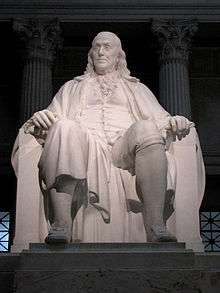
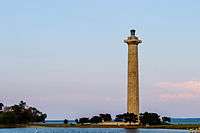
There are 30 national memorials that are NPS units and five affiliated national memorials.[2]
| Name | Location | Area[3] |
|---|---|---|
| American Memorial Park (affiliated area) | Northern Mariana Islands | |
| Arkansas Post National Memorial | Arkansas | 757.51 acres (3.0655 km2) |
| Arlington House, The Robert E. Lee Memorial | Virginia | 28.08 acres (0.1136 km2) |
| Benjamin Franklin National Memorial (affiliated area) | Pennsylvania | |
| Chamizal National Memorial | Texas | 54.90 acres (0.2222 km2) |
| Coronado National Memorial | Arizona | 4,830.22 acres (19.5472 km2) |
| De Soto National Memorial | Florida | 30.00 acres (0.1214 km2) |
| Father Marquette National Memorial (affiliated area) | Michigan | |
| Federal Hall National Memorial | New York | 0.45 acres (0.0018 km2) |
| Flight 93 National Memorial | Pennsylvania | 2,319.36 acres (9.3861 km2) |
| Fort Caroline National Memorial | Florida | 138.39 acres (0.5600 km2) |
| Franklin Delano Roosevelt Memorial | Washington, D.C. | 8.14 acres (0.0329 km2) |
| General Grant National Memorial | New York | 0.76 acres (0.0031 km2) |
| Hamilton Grange National Memorial | New York | 1.75 acres (0.0071 km2) |
| Johnstown Flood National Memorial | Pennsylvania | 177.76 acres (0.7194 km2) |
| Korean War Veterans Memorial | Washington, D.C. | 1.56 acres (0.0063 km2) |
| Lincoln Boyhood National Memorial | Indiana | 199.96 acres (0.8092 km2) |
| Lincoln Memorial | Washington, D.C. | 7.29 acres (0.0295 km2) |
| Lyndon Baines Johnson Memorial Grove on the Potomac | Washington, D.C. | 17.00 acres (0.0688 km2) |
| Martin Luther King, Jr. Memorial | Washington, D.C. | 2.74 acres (0.0111 km2) |
| Mount Rushmore National Memorial | South Dakota | 1,278.45 acres (5.1737 km2) |
| Oklahoma City National Memorial (affiliated area) | Oklahoma | |
| Pearl Harbor National Memorial | Hawaii | 21.64 acres (0.0876 km2) |
| Perry's Victory and International Peace Memorial | Ohio | 25.38 acres (0.1027 km2) |
| Port Chicago Naval Magazine National Memorial | California | 5.00 acres (0.0202 km2) |
| Red Hill Patrick Henry National Memorial (affiliated area) | Virginia | |
| Roger Williams National Memorial | Rhode Island | 4.56 acres (0.0185 km2) |
| Thaddeus Kosciuszko National Memorial | Pennsylvania | 0.02 acres (8.1×10−5 km2) |
| Theodore Roosevelt Island National Memorial | Washington, D.C. | 88.50 acres (0.3581 km2) |
| Thomas Jefferson Memorial | Washington, D.C. | 18.36 acres (0.0743 km2) |
| Vietnam Veterans Memorial | Washington, D.C. | 2.18 acres (0.0088 km2) |
| Washington Monument | Washington, D.C. | 106.01 acres (0.4290 km2) |
| World War I Memorial | Washington, D.C. | 1.39 acres (0.0056 km2) |
| World War II Memorial | Washington, D.C. | 8.25 acres (0.0334 km2) |
| Wright Brothers National Memorial | North Carolina | 428.44 acres (1.7338 km2) |
Disbanded national memorials
| Name | Established | Disbanded | Result |
|---|---|---|---|
| Camp Blount Tablets National Memorial | 1930 | 1944 | Transferred to NPS in 1933 from War Dept., it was never developed; only a stone marker remains off U.S. Route 231 near Fayetteville, Tennessee |
| Fort Clatsop National Memorial | May 29, 1958 | October 30, 2004 | Incorporated into Lewis and Clark National and State Historical Parks |
| Jefferson National Expansion Memorial | December 21, 1935 | February 22, 2018 | Redesignated as Gateway Arch National Park |
| New Echota Marker National Memorial | August 10, 1933 | September 21, 1950 | Transferred to state of Georgia; currently operated as a Georgia state park. |
| Oklahoma City National Memorial | October 9, 1997 | January 23, 2004 | Transferred to the nonprofit Oklahoma City National Memorial Foundation; NPS interpretation continues at this affiliated unit |
Authorized national memorials
| Name | Law |
|---|---|
| Adams Memorial | Authorized by Public Law 107-62 |
| Dwight D. Eisenhower Memorial | Authorized by Public Law 107-117 |
| National Desert Storm/Desert Shield Memorial | Authorized by National Defense Authorization Act 2015[17] |
National recreation areas
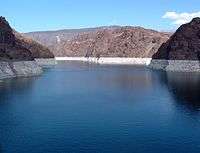
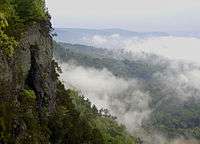
There are 18 national recreation areas administered by the National Park Service.[2]
| Name | Location |
|---|---|
| Amistad National Recreation Area | Texas |
| Bighorn Canyon National Recreation Area | Montana, Wyoming |
| Boston Harbor Islands National Recreation Area | Massachusetts |
| Chattahoochee River National Recreation Area | Georgia |
| Chickasaw National Recreation Area | Oklahoma |
| Curecanti National Recreation Area | Colorado |
Delaware Water Gap National Recreation Area
|
New Jersey, Pennsylvania |
| Gateway National Recreation Area | New York, New Jersey |
| Gauley River National Recreation Area | West Virginia |
| Glen Canyon National Recreation Area | Utah, Arizona |
Golden Gate National Recreation Area
|
California |
| Lake Chelan National Recreation Area | Washington |
Lake Mead National Recreation Area
|
Nevada, Arizona |
| Lake Meredith National Recreation Area | Texas |
| Lake Roosevelt National Recreation Area | Washington |
| Ross Lake National Recreation Area | Washington |
| Santa Monica Mountains National Recreation Area | California |
| Whiskeytown National Recreation Area | California |
Disestablished or transferred national recreation areas
| Name | Established | Disbanded | Result |
|---|---|---|---|
| Arbuckle Recreation Area | February 1, 1965 | March 17, 1976 | Incorporated with Platt National Park and redesignated Chickasaw National Recreation Area |
| Cuyahoga Valley National Recreation Area | December 27, 1974 | October 11, 2000 | Redesignated as Cuyahoga Valley National Park |
| Flaming Gorge National Recreation Area | July 22, 1963 | October 1, 1968 | Transferred to U.S. Forest Service |
| Lake Texoma Recreation Area | April 18, 1946 | June 30, 1949 | Returned to U.S. Army Corps of Engineers |
| Millerton Lake Recreation Area | May 22, 1945 | November 1, 1957 | Transferred to state of California; currently operated by the California Department of Water Resources |
| Shadow Mountain National Recreation Area | June 27, 1952 | March 1, 1979 | Transferred to U.S. Forest Service |
| Shasta Lake Recreation Area | May 22, 1945 | July 1, 1948 | Transferred to U.S. Forest Service |
National seashores
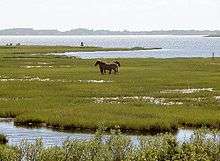
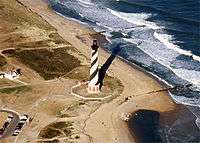
There are 10 national seashores.[2]
| Name | Location |
|---|---|
| Assateague Island National Seashore | Maryland, Virginia |
| Canaveral National Seashore | Florida |
| Cape Cod National Seashore | Massachusetts |
| Cape Hatteras National Seashore | North Carolina |
| Cape Lookout National Seashore | North Carolina |
| Cumberland Island National Seashore | Georgia |
| Fire Island National Seashore | New York |
| Gulf Islands National Seashore | Florida, Mississippi |
| Padre Island National Seashore | Texas |
| Point Reyes National Seashore | California |
National lakeshores
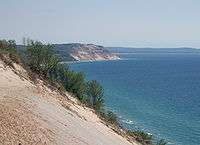
There are three national lakeshores, located in Michigan and Wisconsin.
| Name | Location |
|---|---|
| Apostle Islands National Lakeshore | Wisconsin |
| Pictured Rocks National Lakeshore | Michigan |
| Sleeping Bear Dunes National Lakeshore | Michigan |
Disestablished or transferred national lakeshores
| Name | Established | Disbanded | Result |
|---|---|---|---|
| Indiana Dunes National Lakeshore | November 5, 1966 | February 15, 2019 | Redesignated Indiana Dunes National Park |
National rivers and national wild and scenic rivers

There are five national rivers (marked with an asterisk) and ten national wild and scenic rivers administered as distinct units of the National Park System.[2]
| Name | Location |
|---|---|
| Alagnak Wild and Scenic River | Alaska |
| Big South Fork National River and Recreation Area* | Kentucky, Tennessee |
| Bluestone National Scenic River | West Virginia |
| Buffalo National River* | Arkansas |
| Great Egg Harbor National Scenic and Recreational River | New Jersey |
| Middle Delaware National Scenic River | New Jersey, Pennsylvania |
| Mississippi National River and Recreation Area* | Minnesota |
| Missouri National Recreational River | Nebraska, South Dakota |
| New River Gorge National River* | West Virginia |
| Niobrara National Scenic River | Nebraska |
| Obed Wild and Scenic River | Tennessee |
| Ozark National Scenic Riverways* | Missouri |
| Rio Grande Wild and Scenic River | Texas |
| Saint Croix National Scenic Riverway | Wisconsin, Minnesota |
| Upper Delaware Scenic and Recreational River | New York, Pennsylvania |
National reserves
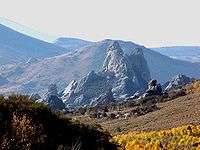
National reserves are partnerships between federal, state, and local authorities. Within the boundaries of the three national reserves are combinations of federal land (Park Service or National Wildlife Refuges), state parks and forests, local public lands, and private properties.
| Name[2] | Location |
|---|---|
| City of Rocks National Reserve | Idaho |
| Ebey's Landing National Historical Reserve | Washington |
| New Jersey Pinelands National Reserve (affiliated area) | New Jersey |
National parkways
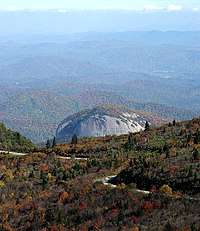
Ten roadways and surrounding scenic areas are managed by the NPS as parkways, four of which as official units and five as part of other units.
| Name[2] | Location |
|---|---|
| Baltimore-Washington Parkway (part of National Capital Parks East) | Maryland, Washington, D.C. |
| Blue Ridge Parkway | Virginia, North Carolina |
| Colonial Parkway (part of Colonial National Historical Park) | Virginia |
| Foothills Parkway (part of Great Smoky Mountains National Park) | Tennessee |
George Washington Memorial Parkway (In 1989, the Maryland and DC portions of the parkway were renamed Clara Barton Parkway to overcome motorist confusion).
|
Virginia, Maryland, Washington, D.C. |
| John D. Rockefeller, Jr. Memorial Parkway | Wyoming |
| Natchez Trace Parkway | Mississippi, Alabama, Tennessee |
| Oxon Run Parkway (part of National Capital Parks East) | Washington, D.C. |
| Rock Creek and Potomac Parkway (part of Rock Creek Park) | Washington, D.C. |
| Suitland Parkway (part of National Capital Parks East) | Maryland |
National historic and scenic trails
These National Park Service trails are part of the larger National Trails System. Only three of the trails are considered official units of the park system.[2]
| Name | Location |
|---|---|
| Ala Kahakai National Historic Trail | Hawaii |
| Appalachian Trail (one of the 419 official units) | Maine - Georgia |
| California National Historic Trail | Missouri - California |
| Captain John Smith Chesapeake National Historic Trail | Delaware - District of Columbia - Maryland - Virginia |
| El Camino Real de los Tejas National Historic Trail | Louisiana - Texas |
| El Camino Real de Tierra Adentro National Historic Trail | New Mexico |
| Ice Age National Scenic Trail | Wisconsin |
| Juan Bautista de Anza National Historic Trail | Arizona - California |
| Lewis and Clark National Historic Trail | Illinois - Oregon |
| Mormon Pioneer National Historic Trail | Illinois - Utah |
| Natchez Trace Trail (one of the 419 official units) | Mississippi - Tennessee |
| New England National Scenic Trail | Connecticut - Massachusetts |
| North Country National Scenic Trail | New York - North Dakota |
| Old Spanish National Historic Trail | New Mexico - California |
| Oregon National Historic Trail | Missouri - Oregon |
| Overmountain Victory National Historic Trail | Virginia - Tennessee - North Carolina - South Carolina |
| Pony Express National Historic Trail | Missouri - California |
| Potomac Heritage National Scenic Trail (one of the 419 official units) | Virginia - Maryland - Pennsylvania - Washington, D.C. |
| Santa Fe National Historic Trail | Missouri - New Mexico |
| Selma to Montgomery National Historic Trail | Alabama |
| Star-Spangled Banner National Historic Trail | District of Columbia - Maryland - Virginia |
| Trail of Tears National Historic Trail | Tennessee - Oklahoma |
| Washington-Rochambeau National Historic Trail | Massachusetts - Virginia |
National cemeteries

Most national cemeteries are administered by the Department of Veterans Affairs, although a few are managed by the National Park Service and the U.S. Army. None of the cemeteries are considered official units of the system; they are all affiliated with other parks.
| Name | Location |
|---|---|
| Andersonville National Cemetery | Georgia |
| Andrew Johnson National Cemetery | Tennessee |
| Antietam National Cemetery | Maryland |
| Battleground National Cemetery | Washington, D.C. |
| Chalmette National Cemetery | Louisiana |
| Custer National Cemetery | Montana |
| Fort Donelson National Cemetery | Tennessee |
| Fredericksburg National Cemetery | Virginia |
| Gettysburg National Cemetery | Pennsylvania |
| Poplar Grove National Cemetery | Virginia |
| Shiloh National Cemetery | Tennessee |
| Stones River National Cemetery | Tennessee |
| Vicksburg National Cemetery | Mississippi |
| Yorktown National Cemetery | Virginia |
Transferred national cemeteries
| Name | Established | Disbanded | Result |
|---|---|---|---|
| Chattanooga National Cemetery | August 10, 1933 | December 7, 1944 | returned to War Department |
National heritage areas
The National Park Service provides limited assistance to national heritage areas, but does not administer them.
Other NPS protected areas and administrative groups


There are 11 NPS units of other designations, as well as other affiliated areas. The National Mall and national capital parks have many sites, some of which are also units of other designations and some are also national historic sites.
| Name | Location |
|---|---|
| Catoctin Mountain Park | Maryland |
| Historic Camden (affiliated area)[18] | South Carolina |
| Ice Age National Scientific Reserve (affiliated area) | Wisconsin |
| International Peace Garden (affiliated area) | North Dakota/Manitoba |
| Inupiat Heritage Center (affiliated area) | Alaska |
| Maine Acadian Cultural Center (affiliated area)[19] | Maine |
National Capital Parks (official unit of other designation)
|
Washington, D.C./Maryland |
| Prince William Forest Park | Virginia |
| Roosevelt Campobello International Park (affiliated area) | New Brunswick, Canada |
| Wing Luke Museum of the Asian Pacific American Experience (affiliated area)[20] | Washington |
| Wolf Trap National Park for the Performing Arts | Virginia |
There are also various administrative groups of listed parks, such as Manhattan Sites, National Parks of New York Harbor, and Western Arctic National Parklands. The NPS also owns conservation easements (but not the land itself) for part of the area called the Green Springs National Historic Landmark District.
Disbanded other areas
| Name | Established | Disbanded | Result |
|---|---|---|---|
| Appomattox Court House National Historical Monument | 1935 | 1954 | Redesignated Appomattox Court House National Historical Park; previously Appomattox National Battlefield Site (1930-1935) |
| Wolf Trap Farm Park for the Performing Arts | October 15, 1966 | August 21, 2002 | Redesignated Wolf Trap National Park for the Performing Arts |
| National Visitor Center, Washington, D.C. | March 12, 1968 | December 29, 1981 | Transferred to Department of Transportation |
| John F. Kennedy Center for the Performing Arts | June 16, 1972 | July 21, 1994 | Transferred to Kennedy Center Trustees |
| New Jersey Coastal Heritage Trail Route (affiliated area) | 1988 | September 30, 2011 | Multiple site agencies continue managing the route without NPS partnership[21] |
In the 1930s and 1940s, the NPS developed dozens of recreational demonstration areas, most of which eventually became national or state parks.
See also
- List of the United States National Park System official units (the 419)
- List of all national parks of the world
- List of U.S. state parks
- National Park Passport Stamps
- List of National Natural Landmarks
- List of tourist attractions worldwide
References
- "National Park System (U.S. National Park Service)". www.nps.gov. Retrieved 2020-01-15.
- National Park Service (2018-05-14). "National Park System Units/Parks". Archived from the original on 2018-03-16. Retrieved 2018-03-15.
- "National Reports". National Park Service. Archived from the original on 22 April 2018. Retrieved 25 February 2018.
Click on Park Acreage Reports (1997 – Last Calendar/Fiscal Year), then select By Park, Calendar Year, <choose year>, and then click the View PDF Report button – the areas used here are the Gross Area Acres which are in the final column of the report
- "This 1,754 acre city park was officially authorized in 1890, making it the third national park to be designated by the federal government." Rock Creek Park, National Park Service. Accessed September 12, 2019.
- "Text - S.47 - John D. Dingell, Jr. Conservation, Management, and Recreation Act". United States Congress. March 12, 2019. Archived from the original on March 18, 2019. Retrieved March 12, 2019.
- Gammon, Katharine (2019-03-12). "Trump approves five national monuments – from black history to dinosaur bones". The Guardian. Archived from the original on 2019-03-17. Retrieved 2019-03-17.
- "Herbert Hoover's National Parks - Herbert Hoover National Historic Site (U.S. National Park Service)". nps.gov. Archived from the original on 29 August 2016. Retrieved 15 August 2016.
- "History". bobspixels.com. Archived from the original on 6 April 2016. Retrieved 15 August 2016.
- "Herbert Hoover: Proclamation 2022 - Grand Canyon National Monument". ucsb.edu. Retrieved 15 August 2016.
- "Enrolled Bill s. 1296 - Grand Canyon National Park Enlargement Act" (PDF). fordlibrarymuseum.gov. January 2, 1975. Archived (PDF) from the original on August 27, 2016. Retrieved August 15, 2016.
- "Great Basin National Park - Lehman Caves National Monument (U.S. National Park Service)". National Park Service. Archived from the original on 2 October 2012. Retrieved 5 January 2012.
- Rogers, Paul (January 10, 2013). "Pinnacles becomes a national park -- the closest to Bay Area". San Jose Mercury News. Archived from the original on 13 January 2015. Retrieved 22 February 2015.
- Andrew Johnson National Historic Site Administrative History Archived 2016-12-29 at the Wayback Machine, National Park Service, 2008, pp. 121-122
- Colonial NHP General Management Plan|https://archive.org/details/generalcolonial00nati Archived 2017-04-30 at the Wayback Machine
- Public Law 107-137 Archived 2019-03-08 at the Wayback Machine, February 6, 2002
- Public Law 87-789 Archived 2018-12-29 at the Wayback Machine, October 10, 1952
- National Park Service-related provisions in the National Defense Authorization Act for FY 15 Archived 2015-07-15 at the Wayback Machine, National Park Service, Dec. 19, 2014.
- Public Law 97-184 Archived 2019-04-12 at the Wayback Machine, May 24, 1982
- Public Law 101-53, November 8, 1990
- Jack Broom, National Parks to recognize Wing Luke Museum Archived 2014-10-13 at the Wayback Machine, Seattle Times, 2013-02-06. Accessed online 2013-02-09.
- "Error retrieving uploaded document". nps.gov. Archived from the original on 16 March 2016. Retrieved 15 August 2016.
- Bureau Historian (2006). "Former National Park System Units: An Analysis".
- National Park Service. "National Monument Proclamations under the Antiquities Act"
- National Park Service Office of Public Affairs (2009). "UNITS & RELATED AREAS & RELATED AREAS IN THE NATIONAL PARK SYSTEM". Last updated January 13, 2017. (Lists 317 NPS units and related areas by classification).
External links
| Wikimedia Commons has media related to National parks of the United States. |
| Wikivoyage has a travel guide for United States National Park System. |
- Alphabetical list of places at the National Park Service website
- Former National Park System Units: An Analysis
- National Park Service
- National Park System Units by type
- National Park Foundation
- Parks by Date of Establishment
- America's Hidden Treasures, an essay on the lesser known National Parks
- The National Park Travelers Club - an organization of individuals attempting to visit all units of the NPS

.jpg)
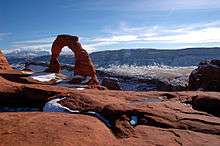
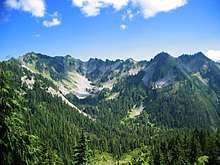
.jpg)
